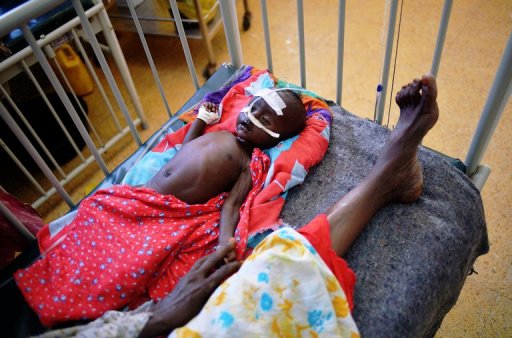Almost 260,000 people, half of them young children, died of hunger during the last famine in Somalia, according to a UN report Thursday which admitted the world body should have done more to prevent the tragedy.
The toll is much higher than was feared at the time of the 2010-2012 food crisis in the troubled Horn of Africa country and also exceeds the 220,000 who starved to death in the 1992 famine.
"The report confirms we should have done more before the famine was declared," said Philippe Lazzarini, UN Humanitarian Coordinator for Somalia.
"Warnings that began as far back as the drought in 2010 did not trigger sufficient early action," he said in a statement.
Half of those who died were children under five, according to the joint report by the UN's Food and Agriculture Organization (FAO) and the US-funded Famine Early Warning Systems Network.
"Famine and severe food insecurity in Somalia claimed the lives of about 258,000 people between October 2010 and April 2012, including 133,000 children under five," said the report, the first scientific estimate of how many died.
Somalia was the hardest hit by extreme drought in 2011 that affected over 13 million people across the Horn of Africa.
"An estimated 4.6 percent of the total population and 10 percent of children under five died in southern and central Somalia," the report said, saying the deaths were on top of 290,000 "baseline" deaths during the period, and double the average for sub-Saharan Africa.
Lazzarini said that about 2.7million people are still in need of life- saving assistance and support to build their livelihoods.
Famine was first declared in July 2011 in Somalia's Southern Bakool and Lower Shabelle regions, but later spread to other areas, including Middle Shabelle, Afgoye and inside camps for displaced people in war-ravaged Mogadishu.
In Lower Shabelle 18 percent of children under five died, the report said.
The United Nations declared the famine over in February 2012.
During the famine, it was feared that tens of thousands had died, whereas the report now shows more people died than in Somalia's 1992 famine, when an estimated 220,000 people died over a year.
Famine implies that at least a fifth of households face extreme food shortages, with acute malnutrition in over 30 percent of people, and two deaths per 10,000 people every day, according to the UN definition.
Somalia, ravaged by nearly uninterrupted civil war for the past two decades, is one of the most dangerous places in the world for aid workers and one of the regions that needs them most.
However, security has slowly improved in recent months, with Islamist fighters linked to Al-Qaeda on the back foot despite launching a deadly bombing campaign.
At the time, most of the famine-hit areas were under their control, and the crisis was exacerbated by their draconian ban on most foreign aid agencies.
The aid agency Oxfam said the "deaths could and should have been prevented".
"Famines are not natural phenomena, they are catastrophic political failures," Oxfam's Somalia director Senait Gebregziabher said in a statement.
"The world was too slow to respond to stark warnings of drought, exacerbated by conflict in Somalia and people paid with their lives."
Over a million Somalis are refugees in surrounding nations, and another million displaced inside the country.
Next Tuesday, Somali President Hassan Sheikh Mohamud and British Prime Minister David Cameron will co-host a conference in London to discuss how the international community can support Somalia's progress.
More than 50 countries and organisations are due to take part.
Oxfam said leaders should "ensure that this was Somalia's last famine" by helping generate jobs and "ensuring trained, accountable security forces".




















































